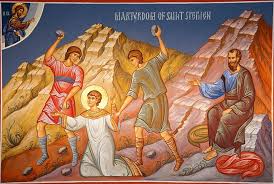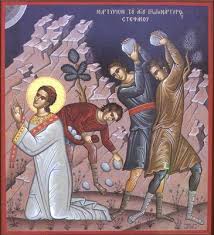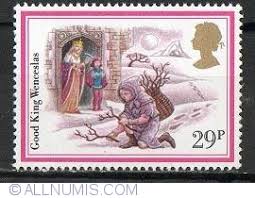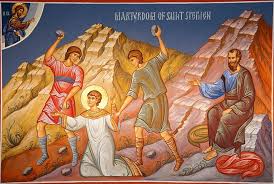 St Alban’s Episcopal Church Bolivar, Missouri Monday, December 27, 2021 The Feast of St Stephen Good King Wenceslas The feast of St Stephen is normally commemorated on December 26, immediately after Christmas Day. That’s odd, isn’t it? We light candles, and sing carols announcing the birth of the Savior one day, and the next day we remember the first person to die as a Christian martyr. It’s delayed a day this year because the first Sunday after Christmas takes precedence. The story is found in Acts 6:8-7:60, but you probably remember it. Stephen was a deacon, one of those who had been put in charge of the money collected by the believers to distribute to the poor. He was also apparently a persuasive preacher, and it wasn’t long before slanderers dragged him before the council, accusing him of attacking Moses and the Law. He was dragged out and stoned – “and the witnesses laid their cloaks at the feet of a young man named Saul.” While they were stoning Stephen, he prayed, “Lord Jesus receive my spirit…” and then, “Lord, do not hold this sin against them.”  If American Christians believe that they are being persecuted by a society that is increasingly multi-cultural and multi-religious, nd even non-religious, this is how they might best respond. There isn’t the slightest truth to the “war on Christmas,” but if there were, this is exactly what Christian privilege is supposed to look like: offering full forgiveness to enemies, and even asking GOD not to hold their wrongdoing against their persecutors. That is exactly how Archbishop Tutu responded to every threat of violence, every abuse by political and religious leaders who were threatened by his controversial conviction that ALL persons were of equal value before God – and that apartheid must be eliminated. He might at any time have been murdered. He wasn’t, but it is also how he treated his enemies while they both lived. This is the other side of the Christmas story: It costs something to believe it. To live it out. To welcome the life that is the light of the world. It just might cost everything. Good King Wenceslas The 10th century was a messy politically and religiously as our own. Wenceslas’ story is also a Christmas one. He wasn’t a “king” but rather a duke, son of a Christian man and his pagan wife. Influenced by his paternal grandmother, he and his younger brother were believers. When his father died, his mother came to power for five years before Wenceslas was old enough to assume leadership. During her reign she persecuted Christians. As soon as Wenceslas assumed his role, he sent her into exile from Bohemia, divided his “kingdom” with his younger brother, and advocated for the poor. Less than a hundred years after his death, his biographer, Cosmos of Prague wrote about how he rose during the night to pray for his people, and and went out to distribute food to the needy. He is revered in Bohemia – part of the Czech Republic, even today.  Good King Wenceslas John Mason Neale, an Anglican priest in England wrote the words to the famous Christmas carol in 1853. Good King Wenceslas looked out On the feast of Stephen, When the snow lay round about, Deep and crisp and even. Brightly shone the moon that night, Though the frost was cruel, When a poor man came in sight, Gathering winter fuel. “Hither page, and stand by me. If thou know it telling, Yonder peasant who is he? Where and what his dwelling?” “Sire, he lives a good league hence, Underneath the mountain, . Right against the forest fence By St Agnes’ fountain.” “Bring me flesh and bring me wine. Bring me pine logs hither. Thou and I will see him dine, When we bear them hither.” Page and monarch, forth they went, Forth they went together. Through the rude wind’s wild lament, And the bitter weather. “Sire the night is darker now, And the wind blows stronger. Fails my heart, I know not how. I can go no longer.” “Mark my footsteps my good page, Tread thou in them boldly, Thou shalt find the winter’s rage Freeze thy blood less coldly.” In his master’s step he trod, Where the snow lay dented. Heat was in the very sod Which the saint had printed. Therefore, Christian men, be sure, Wealth or rank possessing, Ye who now will bless the poor Shall yourselves find blessing. |

Categories:
Tags:
No responses yet